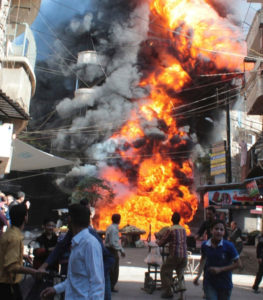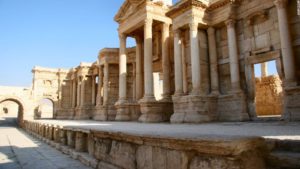Syria and Iraq – a tragic stocktake of conflict
This week Iraqi forces recaptured the ancient Assyrian city of Nimrud which was mostly destroyed by invading ISIS forces defending nearby Mosul – itself also about to be recaptured from the jihadists.
Nimrud was once the greatest city in the Middle East as capital of the Assyrian Empire. It contained vast palaces and monuments that have drawn archaeologists for 150 years.
 In April last year, ISIS posted videos of its fighters smashing relics and planting explosives around historic sites before blowing them up as part of campaign to destroy heritage sites – saying that ancient monuments and idols violate the teachings of its extreme form of Sunni Islam.
In April last year, ISIS posted videos of its fighters smashing relics and planting explosives around historic sites before blowing them up as part of campaign to destroy heritage sites – saying that ancient monuments and idols violate the teachings of its extreme form of Sunni Islam.
Meanwhile in Syria, a Kurdish-Arab allied militia is attempting to retake Raqqa, the other major city under ISIS control.
These two events may be indications that the tide of ISIS supremacy in these areas has reached its high watermark and is ebbing quickly.
Even with the demise of ISIS, the conflict between Russian-backed forces loyal to the brutal regime of President Bashar al-Assad and the militia groups opposed to him could continue for some time.
But this juncture gives pause to assess the scale and brutality of the conflict.
The facts
More than five years after it began, the war has killed around 260,000 people, half of whom are believed to be civilians. Bombings are destroying crowded cities and horrific human rights violations are widespread. Basic necessities like food and medical care are in short supply.
The UN estimates that 13.5 million people in Syria are now in need of humanitarian assistance. Almost five million Syrians are refugees, and 6.5 million are displaced within Syria; half of those affected are children.
Children affected by the Syrian conflict are at risk of becoming ill, malnourished, abused, or exploited. Millions are no longer in school.
Apart from those killed by the conflict in Syria and Iraq and about 650,000 are trapped in besieged locations.
Another 2,300 Syrians and Iraqis have drowned trying to make it to Europe.
There are said to be at least 150,000 political prisoners detained – most by the Assad regime.
Timeline
Every year of the conflict has seen an exponential growth in refugees. In July 2012, there were 100,000 refugees. One year later, there were 1.5 million. That had almost quadrupled by mid-2016.
 Anti-government demonstrations began in March of 2011, part of the Arab Spring. But the peaceful protests quickly escalated after the government’s violent crackdown, and armed opposition groups began fighting back.
Anti-government demonstrations began in March of 2011, part of the Arab Spring. But the peaceful protests quickly escalated after the government’s violent crackdown, and armed opposition groups began fighting back.
By July, army defectors had loosely organised the Free Syrian Army and many civilian Syrians took up arms to join the opposition. Divisions between secular and religious fighters, and between ethnic groups, continued to complicate the politics of the conflict.
In February 2012 the Syrian Government stepped up the bombing of Homs and other cities killing thousands of civilians.
Later in the year massacres of civilians in Houla, near Homs, brought condemnation by Australia, UK, Canada and other countries. In July the Red Cross declared a “full scale civil war” and opened refugee camps.
In April 2013, Abu Bakr al-Baghdadi announced the formation of ISIS and in August the Assad regime used chemical weapons in an attack on rebel-held areas of Ghouta, killing more than 1,000 people.
In early 2014, UN-backed peace talks in Geneva broke down and the Assad regime intensified its indiscriminate barrel bombing regime.
In August, ISIS released the first of its murder videos showing the beheading of captured US journalist James Foley and in September, the US and five Arab countries began air strikes against ISIS around Aleppo.
The situation in Syria went from bad to worse when outside parties, including Russia, began launching airstrikes in the autumn of 2015.
In early February 2016, fighting around Aleppo City intensified. With roads into the city closed by conflict, the humanitarian emergency became a crisis.
In March, Russia started withdrawing its forces from Syria but has since sent an aircraft carrier to the Eastern Mediterranean.
In September at least 23 people, including nine children were killed during airstrikes with the US and Russia accusing each other of violating a ceasefire.
A week later a US airstrike intended to target ISIS killed 62 Syrian troops and an aid convoy and warehouse of the Syrian Arab Red Crescent was bombed with no one claiming responsibility – and prompting a halt to UN aid operations in Syria.
In a latest escalation the weekend of September 23-25 saw an unprecedented 200 airstrikes on Aleppo.
The proxy war
The competing agendas and shifting alliances of powerful nations and groups have fuelled and deepened the crisis in Syria and Iraq.
In the pro-Assad camp is Russia, Iran and the Shi’a militia Hezbollah. Russia’s friendship with the Assad regime stems from the Cold War and it has vetoed repeated UN Security Council resolutions that might have led to military intervention against Assad – whom it has also supplied with weapons.
More recently Russia has been conducting air strikes against Assad’s opponents under the guise of targeting ISIS.
Iran, meanwhile, has been a close strategic ally of the Assad regime and a bolster to its regional rivalry with Saudi Arabia and the Sunni-Arab states. Tehran has spent billions of dollars propping up Syria’s economy and supplies it with military equipment, advisors and intelligence.
In the anti-Assad camp is Turkey which has hosted, trained and equipped the Free Syrian Army and has joined with Saudi Arabia in supplying military aid to the rebels.
Saudi Arabia is supporting the rebels largely because of its long standing enmity with Iran and as a counter to Iranian influence in the region. It hosted a meeting of other Sunni Gulf states in 2015 to work out ways of assisting the rebels with cash and weapons.
The US initially pledged support for the rebels against Assad but recently has directed its efforts at destroying ISIS.
Laurie Nowell
AMES Austalia Senior Journalist












